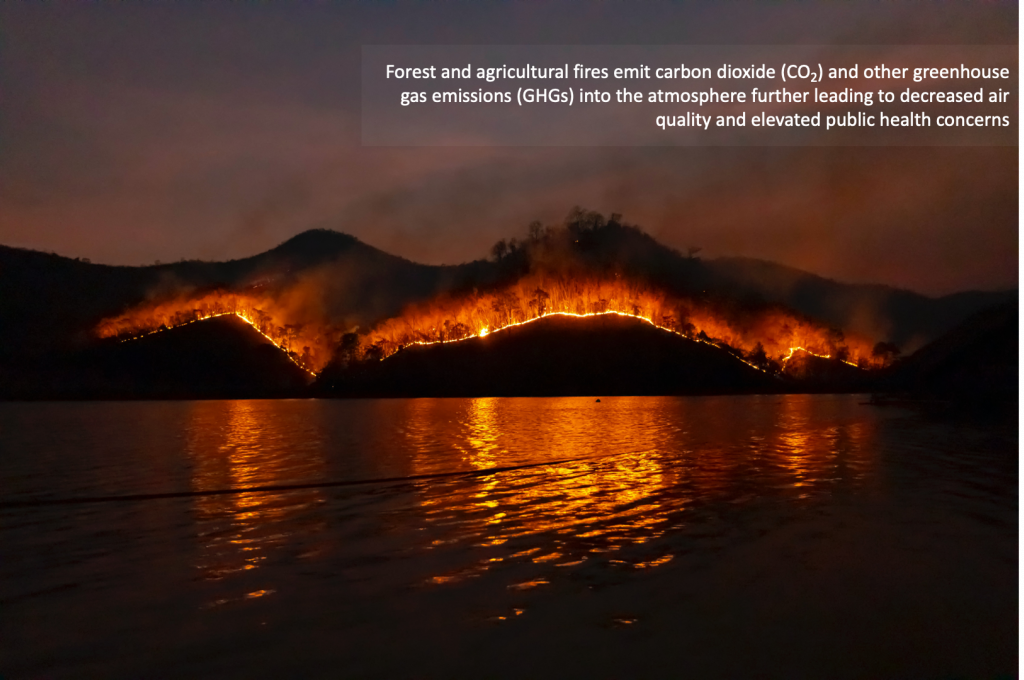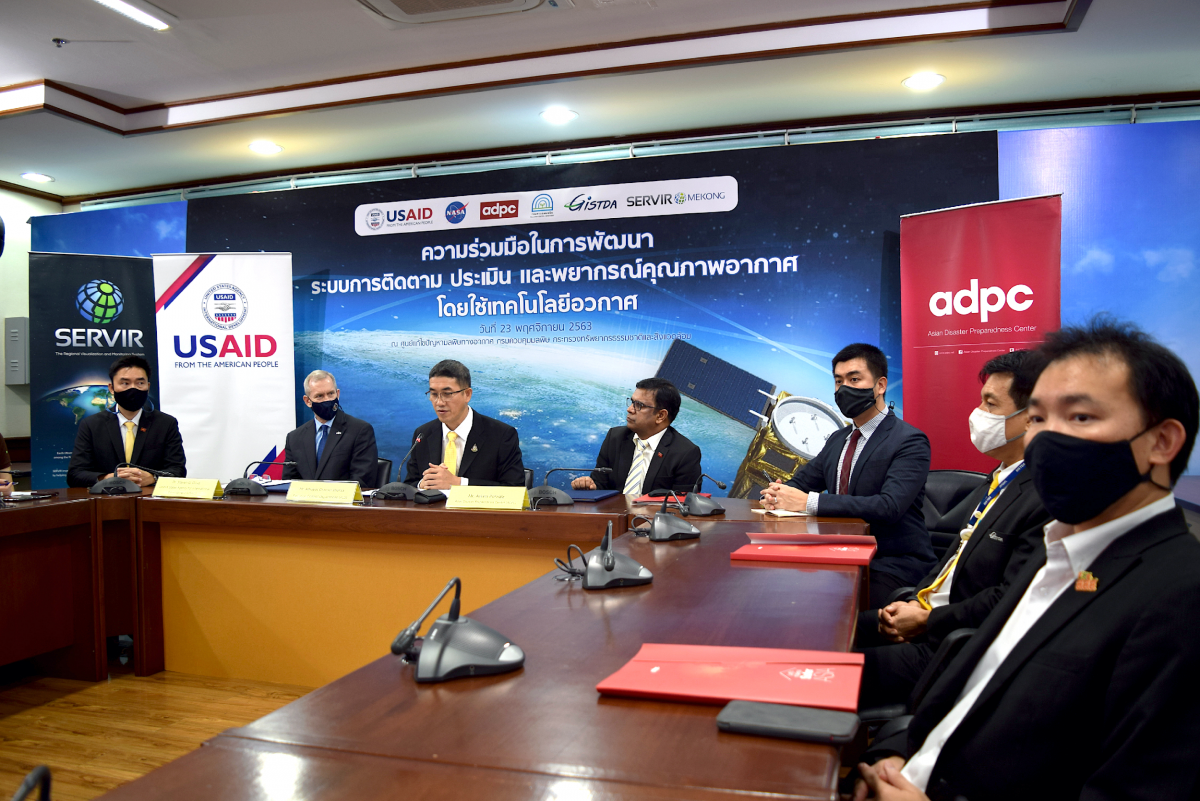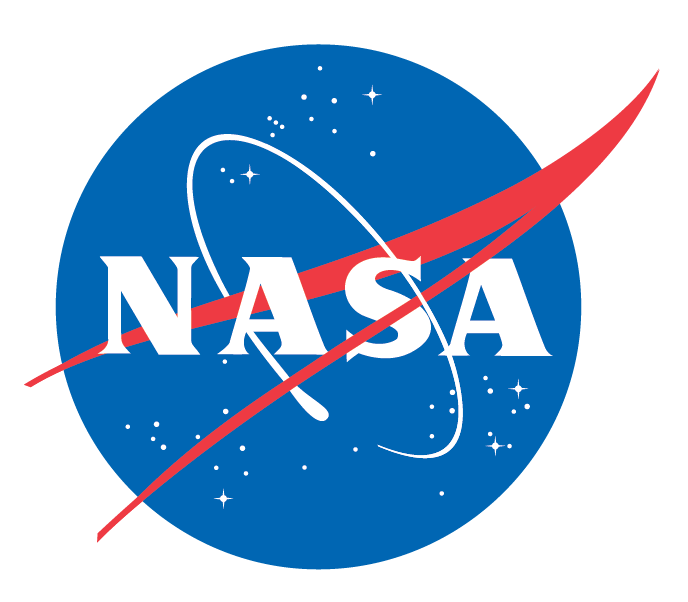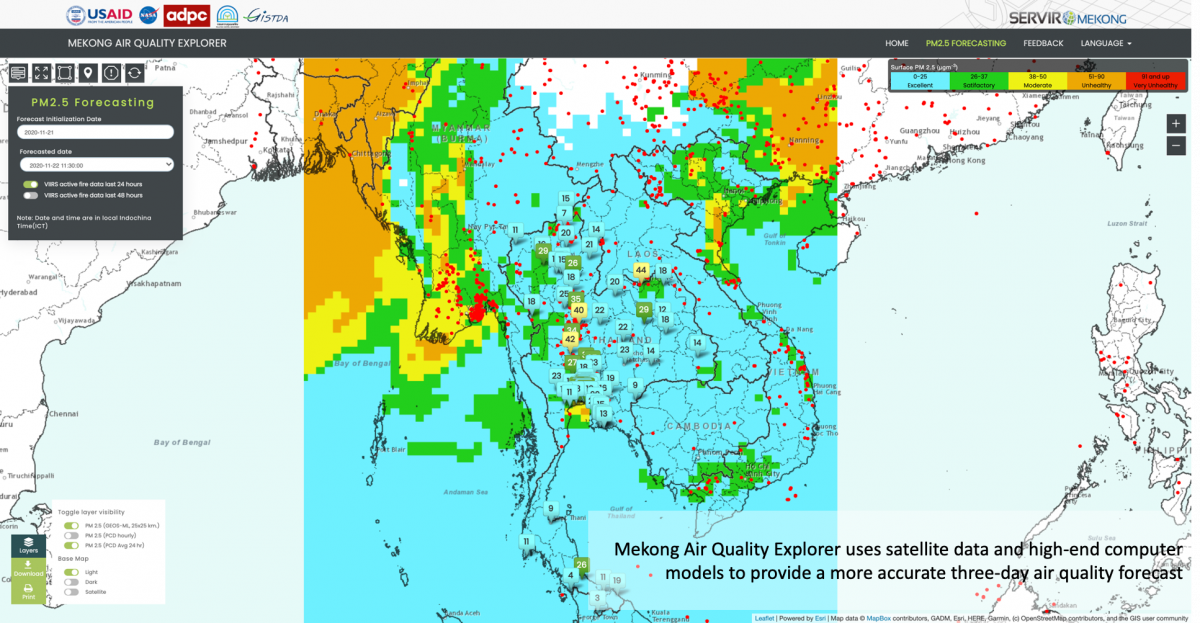SERVIR-Mekong uses NASA Satellite Technology to Address Air Pollution in Thailand and the Lower Mekong Region

The Mekong Air Quality Explorer tool combines satellite data from the U.S. National Aeronautics and Space Administration (NASA) with ground-sensor data and machine-learning analytics to enable monitoring and forecasting of air quality in Thailand. This information helps authorities devise data-driven policies and strategies to tackle air pollution in Thailand.
Over the past decade, the Lower Mekong region has faced major landscape challenges caused by deforestation, human-induced burning of agricultural areas, and forest fires. Fires emit carbon dioxide (CO2) and other greenhouse gas emissions (GHGs) into the atmosphere further leading to decreased air quality and elevated public health concerns.
Over the past decade, Thailand has experienced worsening air pollution due to seasonal agricultural burning coupled with rapid industrial growth. Air pollution is a serious health hazard. Prolonged and continued exposure to air pollution can lead to serious chronic effects including stroke and lung cancer. According to recent research published by the Energy Policy Institute at the University of Chicago, long-term exposure to fine particulate pollution is shortening the average life expectancy in Thailand by more than two years. (Source: The Energy Policy Institute at the University of Chicago)
In response to a request from the Royal Thai Government’s Pollution Control Department (PCD), SERVIR-Mekong worked in close collaboration with the Geo-Informatics and Space Technology Development Agency – Thailand’s space agency – to develop the Mekong Air Quality Explorer tool. This decision support tool combines satellite data from NASA with ground-sensor data and machine-learning analytics to enable monitoring and forecasting of air quality in Thailand. This information helps authorities devise data-driven policies and strategies to tackle air pollution in Thailand.
SERVIR-Mekong is a joint initiative of the U.S. Agency for International Development (USAID) and NASA, implemented by the Asian Disaster Preparedness Center (ADPC) that uses publicly available satellite imagery and technologies to address challenges related to water resources, disasters, climate resilience, agriculture and ecosystems in the Lower Mekong.
On November 23, PCD held a launch event to promote the use of the tool on PCD’s website. The event was attended by Mr. Athapol Charoenshunsa, Director-General of the PCD; Dr. Steven G. Olive, Mission Director for USAID’s Regional Development Mission for Asia; Dr. Lawrence Friedl, Director of the Applied Science Program, Earth Science Division, NASA; and Mr. Aslam Perwaiz, Deputy Executive Director, ADPC.
Speaking at the event, Mr. Athapol Charoenshunsa said that the application of satellite technology in spatially monitoring and reporting air pollution is an effective measure to tackle air quality problems. He added, “I very much hope that the tool that we have developed together will help in solve air pollution problems more effectively.”

“Poor air quality is a seasonal problem in Thailand that has persisted for over a decade,” said Dr. Steven G. Olive. “Through the SERVIR-Mekong project, USAID is pleased to partner with NASA, the Pollution Control Department, and the Geo-Informatics and Space Technology Development Agency to improve the monitoring of air quality and to disseminate this information to the public. In addition to providing Thailand with more accurate air pollution readings, this tool also has the potential to address the transboundary challenges that air pollution poses to the region.”
Data collected using the Mekong Air Quality Explorer tool will enable authorities to design better response strategies to tackle air pollution, particularly from agricultural burning and forest fires - the two major causes of air pollution across Thailand. For example, limited public resources will be prioritised for response in areas that are most severely impacted by air pollution. The three-day air quality forecasts will provide authorities with credible foresight to conduct risk assessments and launch preventive measures.
“We are committed to assisting our host country in the best way possible in building robust systems, strengthening institutional mechanisms and building capacities of government, media, citizens, and private sector in reducing risk from air pollution,” said Mr. Aslam Perwaiz, Deputy Executive Director, ADPC.
After the successful implementation of the Mekong Air Quality Explorer tool in Thailand, SERVIR-Mekong aims to extend its coverage to the other countries in the Lower Mekong Region including Cambodia, Lao PDR, Myanmar and Vietnam to address national and transboundary air pollution challenges.




